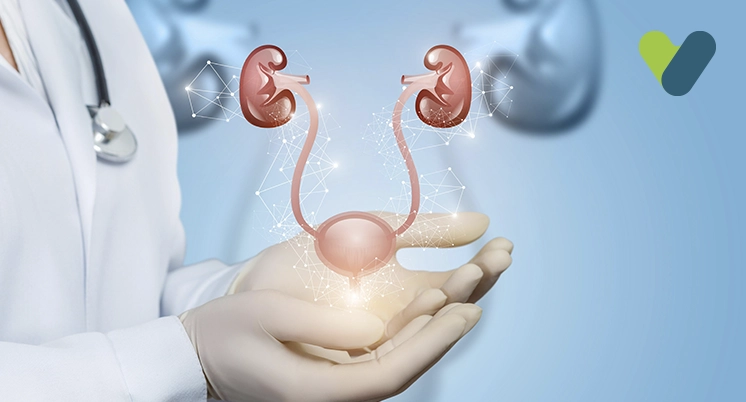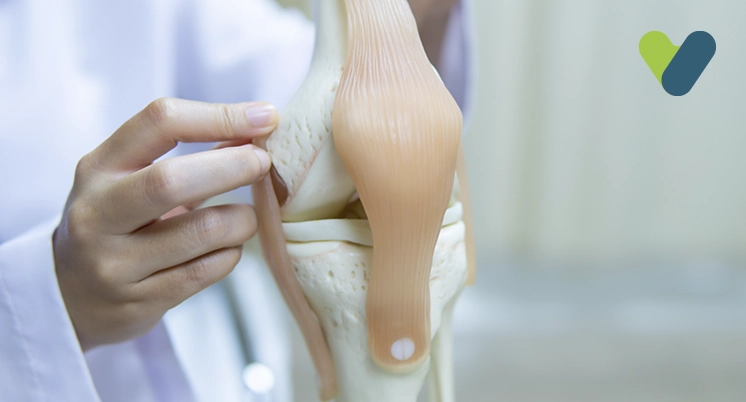Kidneys are one of the most vital organs in the human body that are necessary for a person to stay healthy and be alive. People who have health issues, which impact the proper functioning of both their kidneys can potentially need a kidney transplant surgery.
The kidneys remove waste and excess fluids from a body, thereby helping maintain a healthy balance of water, electrolyte, and minerals in the body. A person usually has two kidneys, which are bean-shaped organs about the size of a fist. If both kidneys are compromised, the person needs regular dialysis to avoid accumulation toxic waste in their body. In some cases, dialysis cannot help in maintaining a healthy body, and the patient might need a kidney transplant.
A kidney transplant can prove to be life changing for a person and have positive impact on their overall health if they find an eligible donor. Let’s understand the process of kidney transplant, eligibility criteria for this transplant, as well as costs and risks associated with it.
What is kidney transplant?
Kidney transplant is a surgical process that is performed to replace a non-functional kidney from a sick person with a healthy kidney. It is also known as renal transplant surgery.When a person’s kidneys are not able to filter and remove excess waste and minerals from the body, they need to be replaced. A healthy kidney is extracted from a living donor or a deceased person who donated their organs and whose family has consented the procedure.
For the kidney transplant operation, the surgeon does not necessarily need to remove the patient’s original kidneys. The new kidney is placed near the bladder during the transplant surgery.
A patient’s body may reject the new kidney, which makes the preparatory stage of any kidney transplant extremely important. A number of tests are done on the donor and the receiver to confirm the compatibility. People can survive and even lead a healthy life with one functional kidney; thus, a renal transplant for one new kidney is recommended to patients with both kidneys failed.
Why is it done?
People who have chronic kidney diseases or end-stage renal kidney failure (also known as end-stage renal disease) need a new kidney to filter out their blood. Conditions, such as diabetes, chronic high blood pressure, polycystic kidney disease, and chronic glomerulonephritis, increase the chances of end-stage kidney diseases.
When the kidneys have reduced functionality, the doctors often recommend regular dialysis with the help of a machine to remove toxins from the patient’s blood. Other treatment option for such patients is a renal transplant, which is usually more effective than dialysis if the patient’s body is able to adapt to the new organ.
Kidney transplant surgery is considered the best treatment option for kidney failure, if any other factors do not affect the procedure. In comparison to dialysis, renal transplants generally lead to the following benefits:
- Improved quality of life
- Reduced risk of death
- Less dietary restrictions
- Low treatment cost over a long period of time
- People who are on dialysis for end-stage renal failure
- People who are likely to be on dialysis soon due to chronic kidney diseases
- People who have a life expectancy of a minimum of 5 years
Eligibility criteria for a kidney transplant
Following are some of the conditions that make one ineligible for a renal transplant surgery:- Severe heart conditions
- Advanced age or short life expectancy
- Cancer or recently treated cancer
- Poorly controlled mental illness or dementia
- Substance abuse or alcoholism
- Recurring infections
In some cases, people can have more than one renal transplant in their lives, but this depends on many factors.
Finding a donor
If the doctor recommends a patient to undergo a renal transplant, they will likely refer the patient to a transplant centre. The patient can consider different options for a transplant centre from the network hospitals of their insurance provider (if you have health insurance). It is better to consider the following aspects while choosing a transplant centre and finding a donor:
- Survival rates of the renal transplant surgery patients of the centre considered
- Number and type of transplants performed at the centre
- All programs offered by the centre that can increase the chances of successful transplant
Once one has finalised a transplant centre, they can move on to the next step of determining their eligibility for a renal transplant. The centre will conduct a few tests, including thorough physical examination, X-rays, MRI, blood tests, and psychological evaluation, to assess the patient’s eligibility for the transplant. These tests can take several days. The following factors are also considered during these tests:
- The overall health of patient and the prospect of taking life-long medication after the transplant
- The patient’s commitment towards maintaining the health of the new kidney if they get a transplant
- Blood type Ideally, the kidney donor and receiver should have the same (or at least compatible) blood type. Renal transplant is possible with incompatible blood type, but it requires additional treatment before and after the surgery as there can be a risk of organ rejection; thus, it is performed only for the people who urgently need a kidney.
- Tissue type If the donor has a compatible blood type with the receiver, the transplant centre moves on to conduct a human leukocyte antigen (HLA) typing test. This is done to compare the genetic make-up of the organs to find a more suitable match.
- Crossmatch This is the final matching test, which is performed to compare the donor and receiver’s blood sample to determine the compatibility. The match is ideal if the test result is negative, and a positive test match indicates a possible renal transplant with additional treatment.
If people are able to find a willing living donor, they can speed up the process and save time spent on finding the right match with a deceased donor. Usually family members, colleagues, and friends opt to donate a kidney, but unrelated people can also be eligible.
How to prepare for the renal transplant?
While one is waiting to find the perfect match for a renal transplant, they should start preparing for the surgery. It is important to maintain optimum health conditions and staying active to ensure a smooth kidney transplant surgery. Here are some things one can do to prepare for the transplant:- Strictly follow the diet and exercise recommendations and medicine prescription
- Quit smoking
- Go for regular health check-ups
- Indulge in activities to promote emotional and physical well-being
During this period, the patient should ensure that they can be easily contacted in a case that the transplant centre tries to reach them for a likely match. Many transplant centres have the policy of waiting for a while to hear back from the patient before contacting the next person on the waitlist for the renal transplant.
Renal transplant surgery procedure
On the day of the surgery, the patient will be required to stop eating 8–12 hours before the surgery as eating during this time period may lead to complications with anaesthesia. The nurses will prepare the patient for the surgery by changing them into a gown and starting antibiotics and other medicines before the surgery. A doctor will administer general anaesthesia to make the patient fall asleep during the surgery. The patient’s vitals will be monitored throughout the surgery.
The surgeon will start by making an incision on one side of the lower abdomen to expose the kidneys and bladder. They will use retainers to hold the tissues and organs out of the way. The surgeon will not remove your kidneys if they are not causing any complications, such as infection and/or high blood pressure, and simply transplant a new kidney. This may leave the patient with a total of three kidneys in their body out of which only one functions properly.
The blood vessels of the new kidney are attached to those connected with your original kidneys; the position of the new kidneys will usually be around the hip region near your bladder. The next step is to connect the ureter of the new kidney to your bladder; a ureter is a thin tube that passes urine from the kidney to the bladder. This will enable the patient to urinate normally. After ensuring everything is in place, the surgeon starts to close the wound.
After surgery care
The patient will spend a few days in the hospital under observation, and the donor (if living) will be observed for a day before being discharged. The healthcare provider will give the patient medicines to prevent the body from rejecting the new kidney and pain relievers to ease discomfort. Usually, the new kidney starts making urine right after being transplanted, and the patient will be urinating normally within a few hours of the surgery.
Most people completely recover from a renal transplant in about 8 weeks and return to their normal life and work. However, it is important to visit the doctor regularly after the surgery to avoid any complications. The patient who underwent this surgery will likely take medications for the rest of your life after the kidney transplant operation to prevent their new kidney from failing and their body from rejecting it.
Risks and complications
A renal transplant surgery also poses similar risks as any other surgery, including infection, blood clotting, and internal bleeding. Some people may also experience side-effects from the medicines; if anything unusual is noticed, the doctor immediately should be consulted immediately. Other potential risks of a renal transplant surgery include the following:- Organ rejection This is one of the major complications associated with a renal transplant. As your body perceives the new kidney as a foreign element, the immune system may attack it. People who have had a renal transplant are prescribed medicine to help their body accept the new kidney.
- Kidney failure The new kidney may also fail for various reasons—including poor diet and lifestyle—after a few years of the transplant. The patient will need another transplant if this happens.
- Temporary lack of kidney function It is possible that the new kidney does not start functioning immediately after the surgery. Some people require dialysis even after the renal transplant until the new kidney resumes normal functioning.
- Diabetes The patient may develop this health conditions due to the medicines prescribed after a renal transplant.
- Cancer Post-surgery medication involves immunosuppressants to prevent organ rejection, which makes the patient vulnerable to diseases including cancer.
Precautions or lifestyle changes after the transplant
Here is the list of things you should avoid to prevent any complications after a renal transplant:- One should avoid lifting heavy weight object for at least 6–8 weeks after the surgery as it can rupture the scar and damage the internal organs.
- It is best not to drive for at least 6 weeks after the surgery and ask for support from friends and family.
- Indulging in heavy impact sport activities is not a good option after the renal transplant. The patient can try to build their strength and stamina for certain activities gradually after consulting their surgeon.
- The patient should avoid contact sports as such sports may cause injuries.
Outlook for patients
A kidney transplant can positively change people’s life and provide them a chance to live a long and healthy life. If one follows the care regimen shared by their doctor and lead a healthy lifestyle, it can drastically increase the success rates of the renal transplant in addition to increasing longevity.
Diet and exercise play a big role in ensuring the new kidney remains healthy and functions properly. Here are some tips on maintaining optimum health after the surgery:
- Regular exercise can greatly impact people’s overall health. A kidney transplant patient can start by basic stretching and walking after consulting their doctor. The doctor can also recommend them to start jogging, hiking, bicycling, or swimming to encourage healthy lifestyle.
- Staying hydrated is important to recovery quickly; additionally, the patient should avoid or limit your daily caffeine intake as it can cause dehydration.
- The patient must ensure to take a balanced meal with plenty of protein to help rebuild their strength and recover fast.
- Immunosuppressants can react with grapefruit or its juice so the patient should avoid consuming them.
- Do not take over-the counter (OTC) drugs, such as ibuprofen and naproxen, which are non-steroidal anti-inflammatory drugs (NSAIDS) before consulting you’re the doctor. Some OTC medicines can affect the kidney.


